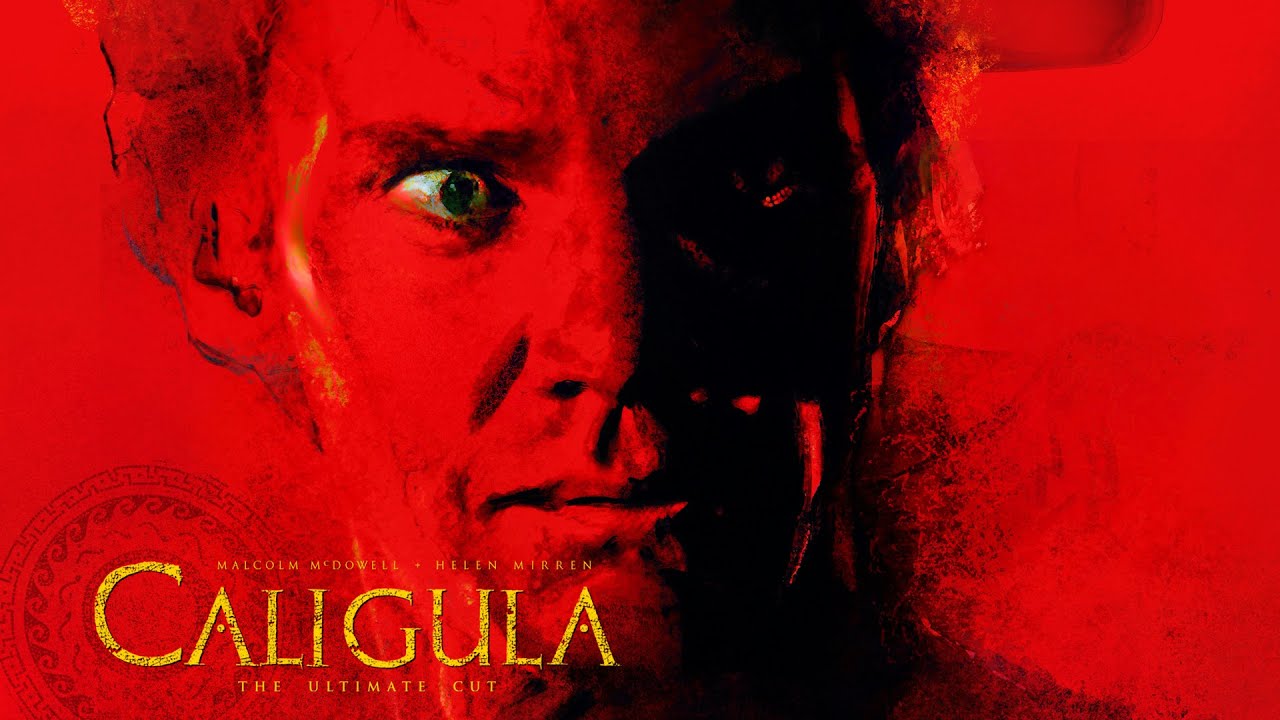Caligula was a goddamn cinematic molotov cocktail that shattered every rule in the book when it came out in 1980. Its production was a freak show fueled by the clashing egos of the director, Tinto Brass, screenwriter Gore Vidal, and producer, Bob Guccione, in a brawl fit for a colosseum. In the end, Guccione strong-armed his way into the editing room, leaving Brass unable to realize his epic and Vidal ditching the project after the numerous rewrites.
The sets were massive and the costumes were lavish. The vast scope of the story required an army of extras, some of which were Penthouse Pets if you were watching the theatrical Guccione cut. His edit featured uninhibited carnal indulgence, that would make a Traci Lords raise an eyebrow. Critics howled about the depravity, audiences choked on their popcorn, and moral guardians frothed at the mouth like a rabid dog.
Caligula was a once-in-a-lifetime film that combined old Hollywood epic filmmaking with Shakespearean thespians with 1970s sexploitation and ultra-violence. The cut that most of the world knew was not the intended film Brass set out to make. Thanks to Thomas Negovan’s painstaking reconstruction of the original negatives, his edit would be closer to what Vidal wrote and would incorporate alternate takes and a complete re-edit cutting all the Guccione footage entirely.
Caligula was always seen as a cult film due to its depravity. There were already a few re-edits before, but Negovan’s cut is a lot more ambitious. Can this new cut finally restore Vidal’s intent? How different is this version and will newcomers enjoy this decadent Roman epic? Find out in our Caligula: The Ultimate Cut review!
Caligula: The Ultimate Cut
Production Company: Penthouse Films International, Felix Cinematografica S.R.L.
Distributor: Drafthouse Films, Sunshine Mesa Films, Vitagraph Films, Analysis Film Releasing Corporation (USA), Produzioni Atlas Consorziate (Italy)
Director: Tinto Brass
Release Date: August 16, 2024 / February 15, 1980 (theatrical)

In the year of our lord, 12 AD, Tiberius Caesar (Peter O’Toole) is rotten with venereal diseases and enjoying himself too much with his “little minnows” in his Capri sideshow of nymphos and freaks. His time as Emperor has made him unbearably cynical and drunk, though that might just be Peter O’Toole’s actual drunkenness coming through his performance.
Tiberius doesn’t have much time left before his STDs completely devour him and it doesn’t take much for his ambitious adopted nephew, Gaius Caligula (Malcolm McDowell) to succeed him and become Emperor. Caligula: The Ultimate Cut depicts how power absolutely corrupts a man. McDowell holds nothing back and brings a lot of the visceral energy he had when he was Alex DeLarge in A Clockwork Orange.
The story follows Caligula and his savage four-year reign. While not all aspects of the film are historically accurate, it gives a highly entertaining depiction of what it might have been like. Caligula surrounds himself with his trusted confidants, including his sister Drusilla (Teresa Ann-Savoy), with whom he has an incestuous relationship, the scheming Longinus (John Steiner), and Caesonia (Helen Mirren), AKA: “the most promiscuous woman in Rome”.

As Caligula descends into madness, his actions become increasingly destructive. Those perceived as threats are executed with a gruesome invention: a three-story-tall, baroque lawnmower built for decapitation. The Emperor grows increasingly resentful of the rigid system that surrounds him, a system blindly followed by all. Wielding absolute power, Caligula finds himself in an existential nightmare. Numbed by his authority, he fills the void with fearsome acts of cruelty and depravity.
The greatest contribution to The Ultimate Cut is how it reinforces the film’s greatest strength: the acting. Malcolm McDowell is fearless as Caligula and it might be his magnum opus performance. He throws himself into the character and the deranged state of mind with manic despair simmering beneath is gripping to witness.
Most of the characters get a lot more screen time to further flesh out their roles thanks to the increased runtime. Helen Mirren as “the most promiscuous woman in Rome”, has more to do and gets more poignant scenes than in the old edits. This was when Mirren was in her prime and she was a looker when Caligula was filmed, and she bares it all and acts very naturally in the role.

Most of the cast and extras end up naked in this film and end up performing some wincing sexual acts, and not all of them are consensual if you know what I mean. Even though all the penetration scenes shot by Bob Guccinone are gone, Tinto Brass is still the man who directed Salon Kitty, the Nazi-sexploitation film. There are scenes in Caligula that Pier Paolo Pasolini would get murdered for. One particular scene involves Caligula turning a Praetorian soldier into a hand puppet and it’s as degrading as it sounds.
Even the background extras perform lewd acts and the film’s leads carry on like professionals. In some instances, it becomes hilarious while McDowell, O’Toole, and Sir John Gielgud are delivering dramatic performances while there is a guy juggling dildos and lesbians are on a sex-swingset in the background. The absurdity of a knight of the realm acting in what is often thought of as a porno will never not be funny to me.

This edit does make a few cuts to streamline the story and maintain a desired tone. The scenes depicting Proculus’ death are gone and some of the conversations on the Nemi ship were replaced with other scenes. While I do lament some of the jokes being excised, The Ultimate Cut is overall a net positive for pacing and tone.
One of the notable features of the Ultimate Cut is how it incorporates alternate takes of scenes fans might have seen before. The story and structure of this edit are broadly the same, but the care put into the timing and cuts utterly transforms the entire experience into a different film.
The introduction features an animated title sequence designed by Dave McKean, whose distinct style relies heavily on digital imagery and filtered archival test footage. This clashes with the film’s raw 1970s aesthetic. The chaotic sequence likely aims to evoke a nightmare, foreshadowing Caligula’s awakening and the events to come, like some kind of deadly premonition. The idea of this intro is neat, but McKean’s style just feels wrong for it.

The soundtrack for the previous cuts of Caligula relied on classical ballet themes and incorporated disco motifs and sound. All of this has been replaced with a moodier and more ambient musical score that fits the tone of the story closer. The original music dated the film as a product of its times, while the new score makes the film feel timeless.
Not everything in the sound department translated well in The Ultimate Cut. Negovan relied on negatives that were missing sound in many cases and he had to add sound where there wasn’t any. Some of the sound effects will stand out, like the very cheesy and overused pottery-breaking sound that finds its way into this film multiple times to comedic effect. Some cutting sounds sound unconvincing and are much louder than they should be.

Caligula is a very lavish and decadent film and the remastering emphasizes the opulent colors of the sprawling sets and intricate costumes. The state of the original negatives must have been in rough shape, but there is no way to tell because the image quality is as clear as a crisp spring morning. There might be some AI trickery done to clean things up, but the final product is seamless.
This isn’t a case like with the 4K release of Aliens where the director used AI to completely change the look and feel of the film’s texture. Caligula: The Ultimate Cut still looks and feels like a grand Roman epic shot in the 70s on celluloid. It is a very bright and colorful film with dense grain and rich details in most angles.

The Ultimate Cut took a film that was very rough around the edges and had sloppy editing choices, refined it, and tightened it up. It is the same story, just told better and longer. It’s still a highly crass and vulgar movie, and while some people may confuse Caligula for an erotic film, it is so in-your-face that it borders on being grotesque and absurd. You get numb to it, like how the Romans eventually did.
Caligula: The Ultimate Cut is not for the faint of heart. It’s an unrelentingly gaudy spectacle, a relentless barrage of explicit sexuality; male and female genitalia, and depraved acts punctuated by shocking violence. The film grabs you by the throat, slams you backward head first, and before you know it, you’re being spit on with raw, Shakespearean insults.
Caligula: The Ultimate Cut was reviewed with a copy provided by Drafthouse Films. Additional information about Niche Gamer’s review/ethics policy is here. Caligula: The Ultimate Cut released in theaters on August 16, 2024.


